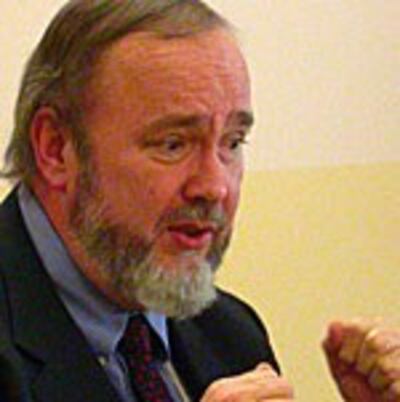WASHINGTON—North Korea’s leader Kim Jong Il is rational and the United States should try to make peace with him, North Korea expert Bradley Martin said here Feb. 7.

"If we want to persuade Kim Jong Il to go easier on his people, we should become friends with him," said Martin, author of the new book Under the Loving Care of the Fatherly Leader: North Korea and the Kim Dynasty.
"The fundamental economic and political interests of North Korea are compatible with those of the United States. It’s time to reconcile and we should do it... If North Korea could cut its military by 90 percent, it would have a huge labor force to devote to getting rich, and I’m sure that thought has occurred to Kim Jong Il," he said.
Just as former U.S. President Richard Nixon paved the way for rapprochement with Beijing by taking a hard line against Chinese communism, he said, U.S. President George Bush has preemptively placated hardliners in Washington with tough rhetoric in his first term about Pyongyang and its rulers.
"I believe it's now time to negotiate an end to that enmity" between North Korea and the United States, Martin said, "and [U.S.] President [George W.] Bush is ideally placed to do it."
"The great danger in Washington is demonizing Kim Jong Il," Martin said. "He's not a madman. He's not a great guy either, but he isn't Hitler, and he isn't a genocidal maniac. He is a despot and a tyrant. He has a record of brutality, and we've seen some massive purges."
U.S. changes tack
In 2002, Bush, in remarks before and during a visit to South Korea, called North Korea "despotic," repeated his demands that Pyongyang pull back its weapons from the border, and said he wouldn’t trust Kim "until he proves to world that he's got a good heart, that he cares about the people that live in his country."
Last week, however, in his annual State of the Union address, Bush dramatically softened his tone, saying only that Washington was "working closely with governments in Asia to convince North Korea to abandon its nuclear ambitions."
Analysts expect the softer U.S. tone will draw North Korea back into six-nation talks on Pyongyang's nuclear program.
Since 2003, the United States, the two Koreas, China, Japan, and Russia have held three rounds of talks aimed at persuading the North to abandon its nuclear weapons development in return for economic and diplomatic rewards.
But no significant progress was reported in those talks, all hosted by China, North Korea's last remaining major ally.
A fourth round of talks scheduled for last September didn't go forward because North Korea refused to attend, citing what it called a "hostile" U.S. policy.
